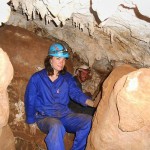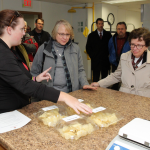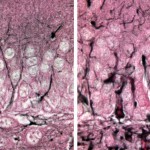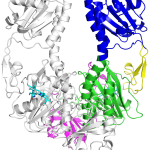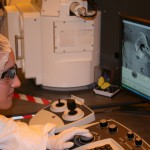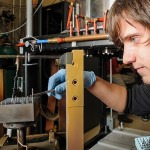Category Science & Technology
Anthropologist, ‘underground astronaut’ strike fossil gold in South Africa dig
Squeezing through a gap called the International Postbox and climbing the jagged Dragon's Back were not in Alia Gurtov's plans for the fall semester, but she made an exception in order to participate in a wildly successful archaeological expedition into a South African cave.
Fledgling supernova remnant reveals neutron star’s secrets
With the help of NASA’s Chandra X-ray Observatory and the Australia Telescope Compact Array, an international team of astronomers has identified the glowing wreck of a star that exploded a mere 2,500 years ago — the blink of an eye in astronomical terms.
Estrogen: Not just produced by the ovaries
A University of Wisconsin–Madison research team reports today that the brain can produce and release estrogen - a discovery that may lead to a better understanding of hormonal changes observed from before birth throughout the entire aging process.
Perennial energy crops could provide environmental benefits
Rows of corn and soybeans cover rolling hills, stitched together by creeks and woodlands that compose southwest Wisconsin's agricultural patchwork. These complex landscapes provide clean water, wildlife habitat and climate benefits, yet, historically their value has been measured in just one way: bushels per acre.
Dairy science in spotlight as field advances
Dairy science is no longer the field of straw hats and bib overalls. The UW’s future is as thoroughly milk-soaked as its past.
Rare disease yields clues about broader brain pathology
Alexander disease is a devastating brain disease that almost nobody has heard of — unless someone in the family is afflicted with it. Alexander disease strikes young or old, and in children destroys white matter in the front of the brain. Many patients, especially those with early onset, have significant intellectual disabilities.
Connection found between nitrogen levels in water and toxic algae production
Scientists have long known that phosphorus fuels growth of algae in lakes and streams. Wisconsin Sea Grant researchers have found that nitrogen levels are a factor in whether or not these algae – specifically, blue-green algae –produce toxins. The findings, published in PLOS ONE have parts of the scientific community buzzing.
New technology could help food crops thrive in crowded fields
With the global population expected to reach 9 billion by 2050, the world's farmers are going to need to produce a lot more food - but without using much more farmland, as the vast majority of the world's arable land is already being used for agriculture.
Science Night is learning for the whole family
Discover your inner scientist with help from University of Wisconsin–Madison researchers at Family Science Night, presented by South Madison Promise Zone and UW Space Place.
Engineers explore ways to understand, outwit blood-brain barrier
MADISON — With support from the New Frontier Science group of Takeda Pharmaceutical Co., University of Wisconsin–Madison engineers are conducting innovative research that could open…
Impulsivity, rewards and Ritalin: monkey study shows tighter link
Even as the rate of diagnosis has reached 11 percent among American children aged 4 to 17, neuroscientists are still trying to understand attention deficit hyperactivity disorder (ADHD). One classic symptom is impulsivity — the tendency to act before thinking.
Program connects community college instructors in high-tech fields
The National Science Foundation's Advanced Technological Education (ATE) program has given thousands of community college instructors the resources to develop new courses, provide professional development opportunities, and create industry-based internship programs - all with a focus in high-tech fields that produce particularly rosy employment prospects for well-trained graduates.
Researcher says for 2-year-olds, touch screens may trump TV
Smartphones and tablets may be better learning tools for toddlers younger than 2 1/2 years old than "Sesame Street" and other educational TV programs, according to a researcher in the University of Wisconsin–Madison School of Human Ecology.
Mentors help inventors make the leap to entrepreneur
It’s a story that could become a company’s founding narrative. The two Steves built their first Apple computer in the garage. Bill Gates dropped out of Harvard to start a software company. And 4-year-old Patrick Heaney broke a plastic sword while play-fighting — and recognized that materials can always stand improvement.

